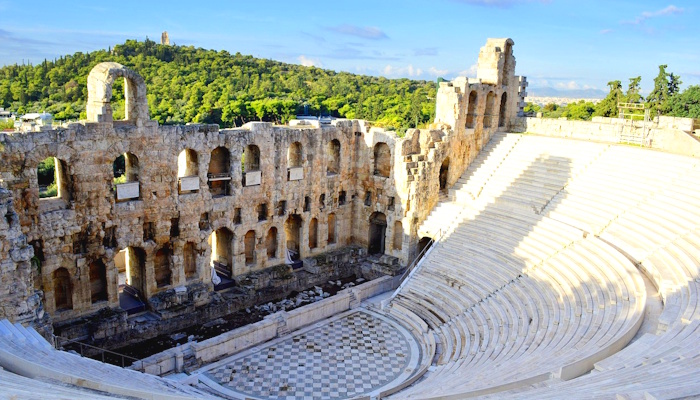The Theatre of Dionysus in Athens: The Birthplace of Drama
Located on the southern slope of the Acropolis, the Theatre of Dionysus is one of Athens’ most historically significant landmarks. This ancient open-air theater is considered the cradle of theater in Europe and was the site where the works of legendary playwrights such as Sophocles, Euripides, and Aristophanes were first performed. For history buffs, theater lovers, and travelers alike, a visit to this cult site offers a unique insight into the origins of the dramatic arts and Athenian culture.
Good film: Theatre of Dionysus next to the Acropolis in Athens (YouTube, English)
History of the Theater of Dionysus
The theater was dedicated to Dionysus, the Greek god of wine, feasts, and theater. It was originally built in the 6th century BC and evolved over the centuries into the magnificent structure that still stands today. The complex was the center of the Dionysia Festival, a major annual event in which playwrights competed to perform their best tragedies and comedies.
Acropolis Admission Prices: The Acropolis admission price includes access to the Propylaea. Due to long wait times at the Acropolis ticket offices, please purchase tickets online using this link.
During the Roman era, the theater underwent several modifications, including the addition of a more elaborate stage and VIP seating for Roman dignitaries. Although it eventually fell into disrepair, extensive restoration work has helped preserve its heritage.

Architecture of the Theatre of Dionysus
The Theatre of Dionysus, one of the earliest stone theatres in the world, demonstrates the ingenuity of ancient Greek design:
Theatron (seating area): The semicircular arrangement of the rows ensured optimal acoustics, allowing even the audience furthest from the stage to hear the performances clearly.
Orchestra (performance area): A circular space where the chorus performed, which was the heart of dramatic storytelling in ancient Greece.
Skene (backstage): A structure behind the orchestra used for costume changes, scenery, and scene transitions.
Thrones of Honor: Carved marble seats in the front row reserved for prominent figures, including the High Priest of Dionysus.
Significance of the Theatre of Dionysus
The Theatre of Dionysus played a pivotal role in shaping Greek culture. Tragedy, comedy, and satyr plays flourished here, influencing theater traditions throughout the world. Great playwrights such as Aeschylus, Sophocles, and Euripides introduced timeless themes such as fate, morality, and human nature, while Aristophanes brought political satire and humor to the stage.
The theater’s significance went beyond entertainment—it was a place where civic values, philosophical ideas, and democratic ideals were debated and reflected through art. This influence spread throughout the Roman Empire and later into the Renaissance, cementing its status as the foundation of modern theater.
The Theater of Dionysus Today
Although much of the original structure has been lost to time, archaeological excavations and restoration work have helped preserve this historic landmark. Today, visitors can walk through the ruins, sit on the ancient marble seats, and imagine the magnificent performances that once captivated Athenian audiences.
Visit the Theater of Dionysus
How to get to the Acropolis: The theater is located on the southern slope of the Acropolis, near the Acropolis Museum.
Acropolis Athens Opening Hours: The site is part of the Acropolis complex and has similar visiting hours, although these vary seasonally.
Acropolis Tickets: Admission to the theater is included in the Acropolis Multisite Ticket, which provides access to several ancient sites. Due to long queues, it’s best to purchase tickets online through the ticket provider Getyourguide.
A visit to the Theater of Dionysus is an unforgettable experience for anyone interested in history, theater, and Greek mythology. Walking through this ancient site, visitors can step back in time and experience the birthplace of drama, where the first great stories of Western civilization were told. Whether you explore it independently or with a guided tour, the Theater of Dionysus is a must-see in Athens.
Who is Dionysus?
Dionysus (Greek: Διόνυσος) is the god of wine, fertility, ecstasy, and theater in Greek mythology. He is one of the twelve Olympian gods, although he plays a special role because he was later incorporated into the circle of gods.